Cate Blanchett – Rewrites the Book On Scandal
- PopEntertainment
- Feb 21, 2007
- 5 min read
Updated: May 7, 2023
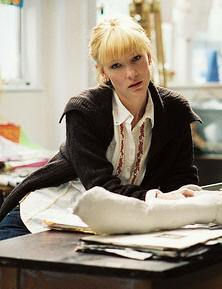
Cate Blanchett stars in Notes On a Scandal.
Cate Blanchett
Rewrites the Book On Scandal
by Brad Balfour
In Notes on a Scandal, a high-school teacher Sheba Hart (Cate Blanchett) starts an affair with one of her students, Steven (Andrew Simpson), and is discovered and emotionally blackmailed by her colleague Barbara (Judi Dench, receiving a Best Actress Oscar nomination for this film). As adapted by Patrick Marber – who garnered accolades over his previous screenplay Closer – Zoë Heller's 2003 Booker-shortlisted novel becomes a Hitchcockian treatise on betrayal and obsession.
Blanchett has become a Hollywood institution without actually having become Hollywood, acting in such acclaimed films as Elizabeth, Charlotte Gray, and The Lord of the Rings trilogy. This has been a particularly good year for Blanchett, having starred in three similarly-lauded films – The Good German, Babel and Notes – which landed her in the Best Supporting Actress category for this year's Oscar.
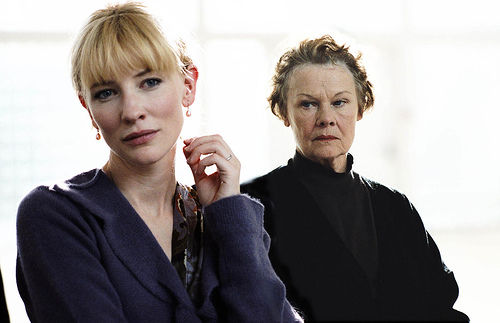
Is it important to be inquisitive – as inquisitive as say, Barbara, while performing in or watching Notes on a Scandal?
I think it's important to ask all the questions, but not necessarily to answer them. It's important to let all of those ambiguities breathe because once [Sheba] dives in [the affair with Stephen], there's no way back. The wound is open and there's no way in closing in, no matter if the affair ends or not. Given the damage to her children, to her husband, to herself, she's on the public hit-list, so to speak and will be forever so.
How did you get into this role?
Once I understood Sheba as being somebody who's incredibly lost, enormously fragile – and a time bomb, there was a way "in" for me.
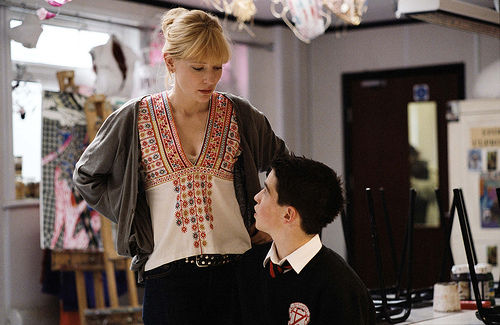
Did you use the novel when you prepared for your part?
The novel [of the same name by Zoë Heller] was a great source, but it was from a very unreliable narrator. It's all from Barbara's perspective. I think what Patrick [Marber, playwright and screenwriter of Notes and 2004's Closer] did with the screenplay, which is fantastic, was to liberate Sheba from Barbara's perspective. That enabled the film to become its own entity.
One review put forth the idea that while Sheba is in an incredibly lonely position, it's not due to a lack of love in her life. How complicated was it to get that sort of nuance into the character?
Well anyone who embarks on a destructive relationship like that.... There's an enormous cry for help in there. Sheba doesn't actually know where to start. What I like about the film is that it doesn't really attempt to justify or explain in simple terms why Sheba does what she does. If she sat down on the analyst's couch and had about fifteen years to deconstruct it, she might find the language to explain it, but I like how fragile she was.
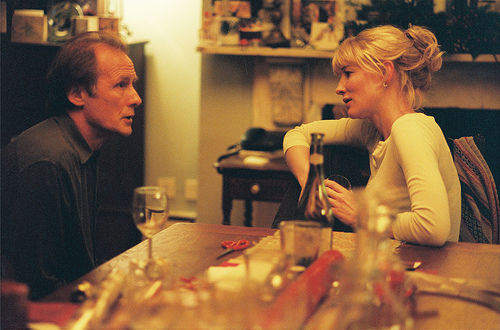
How do you think Sheba and Barbara ultimately felt toward one another?
I think that they both underestimated one another, Sheba to a fatal degree. Sheba feels quite sorry for Barbara in a lot of ways and has no idea of the lengths to which Barbara will go to attach herself to her. And I think Barbara completely underestimates how lonely Sheba actually is. I think she just sees the trappings of her life and how peopled it is.
So how tough was Judi Dench during the fight scene?
She can hold her own. We had to do that [scene] quite a lot and she had this, sort of, ninja turtle [thing] and I had to thrust her into the bookshelf. We were both dreading the scene, actually. Because it – it reaches a certain level of absurdity – the stuff that they're saying to one another. It's actually thrilling to hear the words that Patrick put into the characters' mouths because the stakes are so high and "Where did you get my hair? Did you pluck it from the bath with some special fucking tweezers?!" [laughs] It's a pretty great line.
Did you ever consider what would happen if Barbara didn't expose the secret?
Sheba's not someone who's going to write her life story. She's not Mary Kay Letourneau [notorious American schoolteacher who went to jail for having sex with her 13 year-old student and once released, married him] or somebody who stayed with the boy. We did talk a lot about what would happen if Barbara didn't expose the secret and I, sort of, feel like it would peter out.
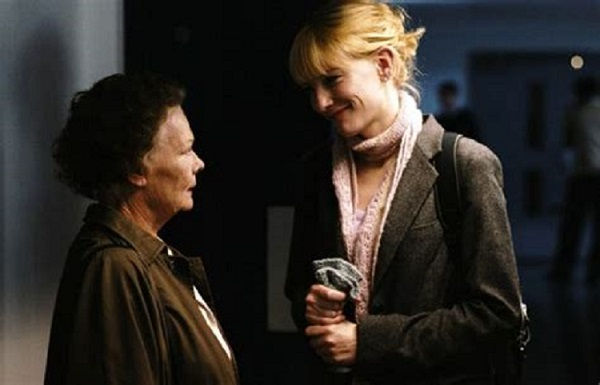
It's interesting that it doesn't. There's a desire to blow apart her world. She describes herself as a good wife and a good mother. There's a sense that she just wants to fuck it all up. I think that there are a lot of people who feel that way. The more happy people perceive them, the more they want to destroy it all and almost start again and have an adolescence that she never had. Sheba herself married her teacher, so there's an echo, there's a mirror up there held to herself. Were you able to suspend your moral judgment? Yes, absolutely. I think it was very important for me to suspend my own moral judgment because there is no way to defend what Sheba has done. I don't think that this film intends to do that at all. The main thing is that the relationship with Steven is the catalyst which propels her into Barbara's arms and there lies the true drama and its delicious and thrilling side. Is there universality to Barbara's self-involvement? Look — [I think] we're all absorbed in our own lives and we're the heroes of our own narratives. How did you feel about the way that Heller imagined Barbara in the book version of Notes? It was an interesting description because it was all from Barbara's perspective. Barbara never struck me as somebody who had an enormous fashion sense. She describes [Sheba] as being fey and I found that quite helpful. She describes her dress as being floaty. The costume designer and I talked about fabric that floated. Given the hard edge of the punk of her adolescence, I had met several English women like that. They all had bangs and there's a, sort of, gossamer quality to them.
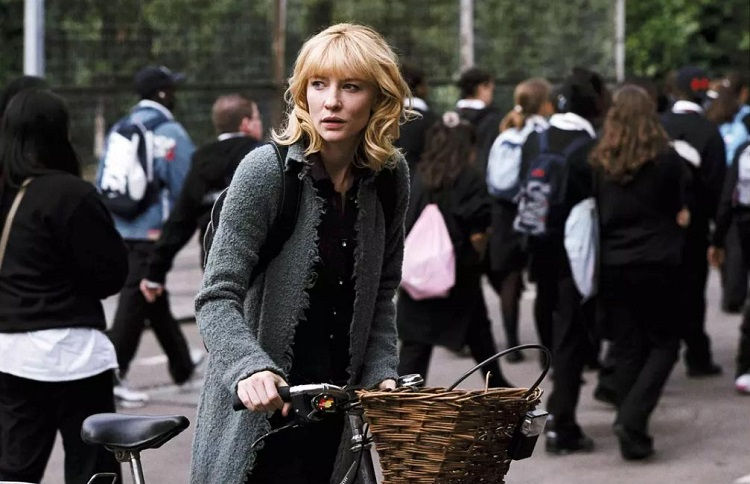
Since you are working with an amazing set of actors, director and screenwriter all schooled through theater, what's the difference between actors in plays and actors in films? People who primarily work in film can be very private about their process. There's something about being in a theater rehearsal room where people just go for it and they're not embarrassed to make mistakes because they realize that it's just a rehearsal. So, it's a much more open process. With Notes, it was a very open set. That comes from the director, Richard Eyre, who runs the National [Theater] and is an extraordinary producer, but also, as a director, he's a great lover of actors. It was certainly enjoyable from that perspective. You could just feel like you could muck it in and throw it all around. There wasn't really any judgment. How does it feel getting all this press for doing The Good German, Babel and Notes on a Scandal? I'm certainly sick of talking about them [laughs] – proud as I am of them. But they're all very different. To have gone from Notes on a Scandal to The Good German and to be part of an endeavor like Babel — they are three things that I am very proud of. Years like this don't come very often.
Copyright ©2007 PopEntertainment.com. All rights reserved. Posted: February 21, 2007.
Photo Credits:
#1 © 2006. Courtesy of Fox Searchlight. All rights reserved.
#2 © 2006. Courtesy of Fox Searchlight. All rights reserved.
#3 © 2006. Courtesy of Fox Searchlight. All rights reserved.
#4 © 2006. Courtesy of Fox Searchlight. All rights reserved.
#5 © 2006. Courtesy of Fox Searchlight. All rights reserved.
#6 © 2006. Courtesy of Fox Searchlight. All rights reserved.


Comments